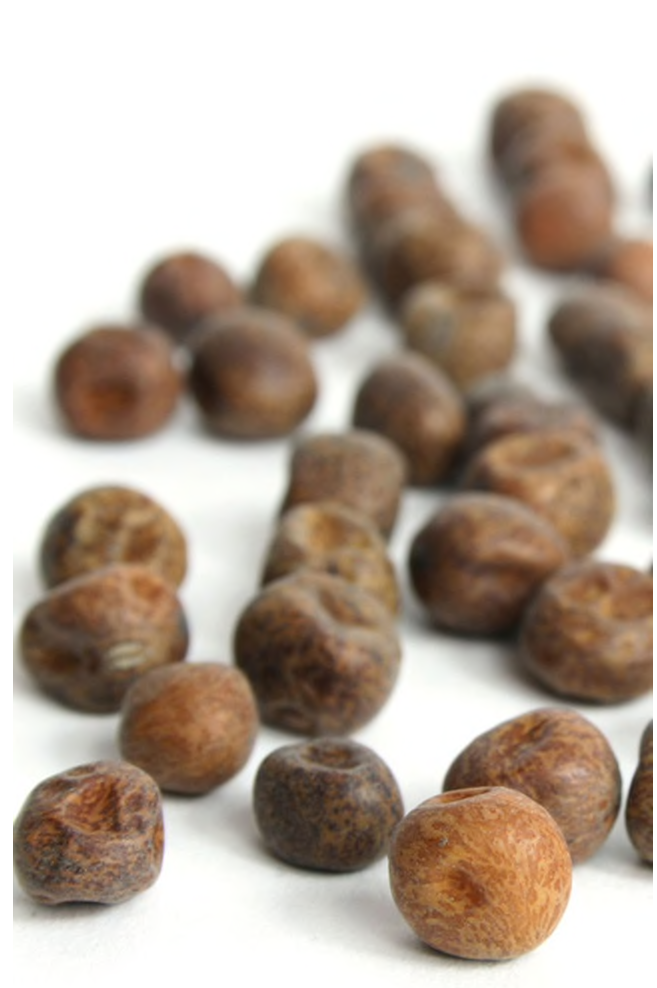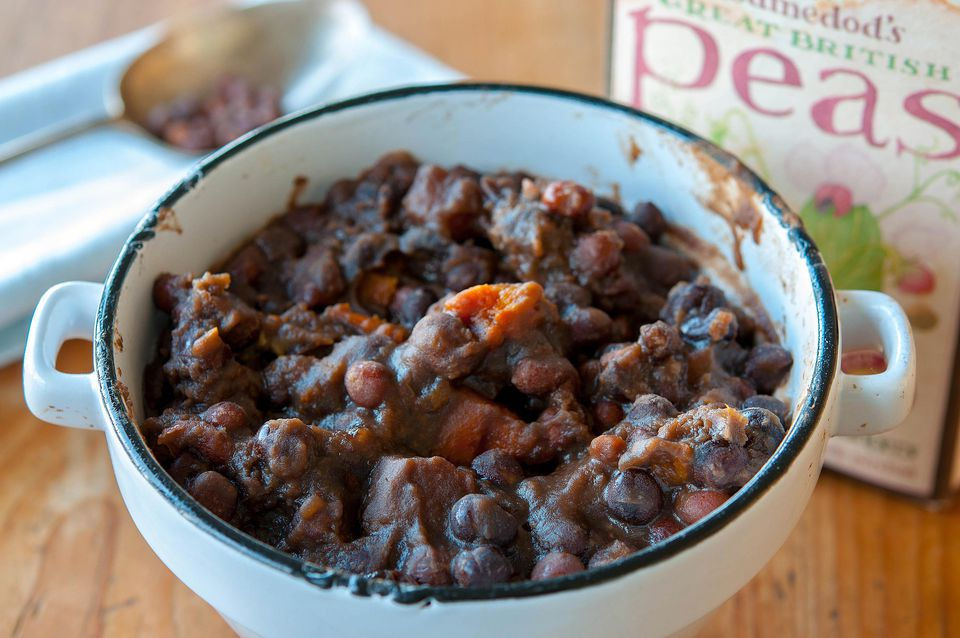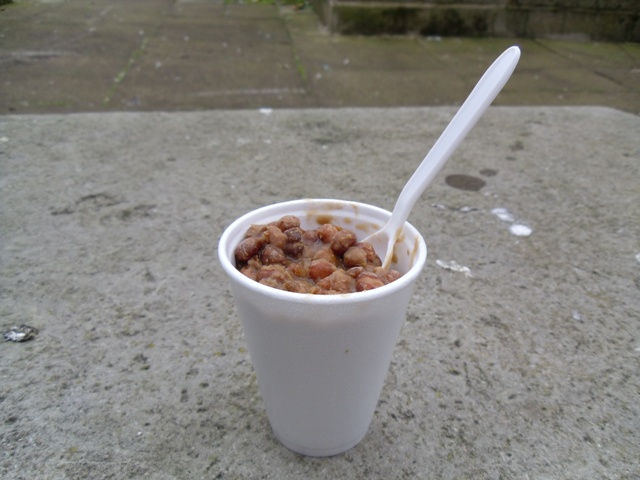Black peas and an enterprising British company
- Aug 4, 2018
- 5 min read

"Basically, the trick it seems is to boil them to the back of beyond, so they have no memory remaining of their life as a hard, dried pea!"
(Very sorry - I forgot to write in the name of the person who wrote the above quote and now I can't find it.)
This was going to be a quickie derived from my friend Graham reminiscing about mushy black peas parkin and hot cocoa - (more posts, another time) in response to my post on golden syrup.
I was intrigued. I had never heard of black peas - mushy peas yes, but black peas no. And then a few days later my husband bought me some black turtle beans - never heard of them either - and I wondered if they were the same thing. But no they are not and I will do the black turtle beans another time. For today it's black peas - otherwise known as carlin peas, maple peas, black badgers, brown badgers, field peas, parched peas, pigeon peas, shipwrecked peas and little godmothers. There is just too much to say to do black turtle beans as well.
As you can see from the picture above, they are actually more brown than black although I did see one picture that had them looking pretty black. They don't look black when cooked either.

According to Wikipedia they are field peas rather than garden peas. I think they are left to dry on the vine as it were. The botanical name is Pisum sativum var. arvense, but I think there must be varieties of this as well, because the Wikipedia article on field peas had a couple of other examples, which I suspect are a bit different from the ones we are talking about here.
Field peas however, are a very old crop - 7,000 years was the figure I saw. And the various mushy pea dishes I am about to talk about in England date back to at least medieval times. That well known medieval dish of pottage was probably made from them. And, of course, being a legume they are very nutritious.
"They contain a wide range of nutrients, notably manganese, molybdenum and the B group of vitamins, especially B1. They have a distinctive red/blue colour to both the skin and flesh, derived from anthocyanins. These are plant chemicals that have antioxidant and anti-inflammatory properties, and are thus the subject of research linked with cardiovascular care, diabetes management, eye care and some forms of cancer." Ian Marber - The Telegraph
The mushy black pea thing though is not just a general northern thing. Different ways of serving them are specific to different areas. My friend Graham is from Lancashire, where they are called parched peas - and it's actually not just Lancashire in general either. There are lists of towns on Wikipedia and here and there, but I have to say the list varies a bit - I remember Bolton, Preston, Manchester, Oldham being mentioned a lot though. Traditionally in Lancashire they are served on bonfire night as Graham indeed, did say:
"On bonfire night we always had black peas, parkin and hot cocoa standing round the fire after the fireworks had all been let off. Happy days."

However, I could find no real explanation for why bonfire night. Mind you they do also seem to be a street food served at fairs and to this day there is a stall in one of those towns that serves them. Traditionally they were served in white porcelain cups - most probably as in the picture above but these days they come in a plastic cup.
Parched, by the way, is an old word for slow-boiling.
The Spruce Eats had a recipe for making them, and this one sounded quite tempting - apart from the time it takes to boil them, but I have to say that most of the rest of the recipes were much simpler - not flavourings other than salt and pepper and some bicarb. In Lancashire though they are always served with lashings of vinegar - I am assuming malt vinegar.
Over in the North East, however, they may start off cooking them the same, but they finish them by frying them - in your chosen fat - butter, lard, oil, dripping. There they are also called Carlin peas. The derivation of the word Carlin is not quite clear. It could be from the name for the Sunday before Palm Sunday - Caring Sunday or Carlin Sunday, or the name of that particular Sunday could be derived from the dish. They also think this may come from an incident in the Civil War when Newcastle under siege, survived on a cargo of black peas from a shipwrecked boat. And here in the North East, this is when they are traditionally eaten - on the last Sunday in Lent. The Hodmedod site has a really good page on this version.

Then there's the Black Country - a little further south - around Birmingham where they apparently call them grey peas and serve them with bacon. Nikkipedia has a recipe for these, and also some explanations of the origins of the dish and also why 'the black country'.
Less traditionally, Ian Marber, who wrote the Telegraph article had a few more 'mod' suggestions.
"Drained, rinsed and patted dry, I have simply warmed them on the hob with a little extra virgin olive oil. I’ve tried them with chill flakes and cayenne pepper too, but if you fancy my brand new one-week-old nutrition professional's interpretation of the classic baked potato and beans, simply take one large baked sweet potato, split in two and spread with warmed carlin peas and extra walnut oil. Top with chopped feta cheese and a splash of balsamic vinegar."
I have to say I have no idea what black beans taste like - beany I suppose. However, when looking to the answer for this I found this fascinating article from Serious Eats by J. Kenji López-Alt which was an experiment on whether to soak or not to soak the beans. The conclusion was don't - but then again there's that quote at the top of the page that implies they are hard to get to be soft.
And pigeon peas are mostly just that - peas for pigeons, and probably not eatable by humans, though nobody seemed too sure about that. There are some other peas from the Caribbean called pigeon peas but they are not the same thing at all.
Incidentally I think it would probably be hard to find black peas here in Australia. They truly do seem to be a traditional British thing that hasn't travelled - not even to the south of England. Which is interesting considering how far and fast tiramisù has travelled isn't it? Maybe they're just not that great. Sorry Graham.

But to conclude I cannot leave this subject without referring to an East Anglian company called Hodmedod's, who seem to now be the major supplier of black peas to the British.
First of all the name. What on earth does it mean? Well basically - something round or curled up - which led to an association with hedgehogs (on their logo). But do read their rather lovely little explanation.

It's a young company founded in 2012 by three East Anglian young men, who began with fava beans and gradually expanded to market other British legumes - including the aforesaid black bean. The website is lovely and includes recipes for things like:

Their products have also expanded into Quinoa and tinned and roasted beans. In 2017 they won the Award for Best Food Producer in the BBC Food and Farming Awards, which sounds pretty impressive. There were thousands of aspiring winners.
So full marks to a company concerned about good food, and in reviving traditional foods that were on the verge of disappearing.

Thanks Graham.












Comments